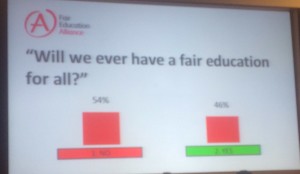Can or Will? The Fair Education Question
10th December 2014
An enormous question closed last night’s Fair Education Alliance Report launch: “Will we ever have a fair education for all”. As an audience we had to pick between two possible answers. Yes. And no. I chose not to vote. So am I a pessimist? Am I indecisive? No.
If the question were: “Can we have a fair education for all” I would absolutely and without hesitation have answered yes. But that wasn’t the question. Instead my response depends on what type of world we expect to emerge over the next few years.
Unfortunately, at times it can sound like teachers are the only cog in the system and this is simply not the case. As Ife Grillo pointed out there are parents currently working three jobs just to pay the bills; as Louise Tickle reported in The Guardian last month, there are schools forced to spend their pupil premium on feeding hungry pupils. If that is the future then no – education outcomes probably will never be fair. Schools will interminably be playing catch up.
Some respond to this argument by pointing to schools that defy the odds: Surely these show that schools can, and do, make the difference? This is true – and we should celebrate and learn from these heroes. However, society cannot and should not be built on heroicism: the transformative schools in which teachers work crazy hours should be admired, but we should not expect every school to pursue the same model – I would no more want to marry and raise children with someone working 12-14 hour days than I would want to live in a society where that were the norm. To expect a workforce of hundreds of thousands of teachers to accept that lifestyle for the duration of a career is not a system level solution.
Furthermore, as I’ve argued before, why should schools bear the full burden of helping pupils cope in the vacuum left by dysfunctional communities, decimated youth services and underfunded mental health provision? At what point do we ask what our society is doing beyond the school gates? Given the status quo, of course, schools should do all they can about these things; it is the compassionate and vocational response to the world as we see it. However, schools’ dedication to defeating the accident of birth should not let everyone else off the hook. It is incumbent on those of us working In education to do ‘whatever it takes’ to make education fair but it is also incumbent on those working in welfare, health, transport, planning and business to do their bit. Speaking as if ‘teacher heroicism trumps-all’ – does no one any favours.
Ultimately, making education fair should be every teacher and educator’s professional raison d’être. But let’s not allow well intentioned zeal to make us myopic about fairness – if the rest of policy and society doesn’t play its part too, we could be in serious trouble.


Comments